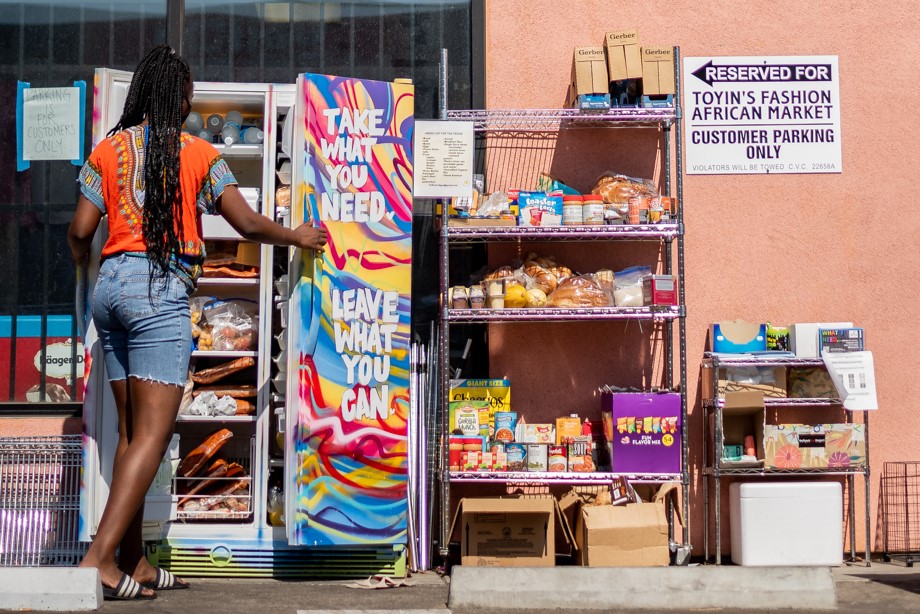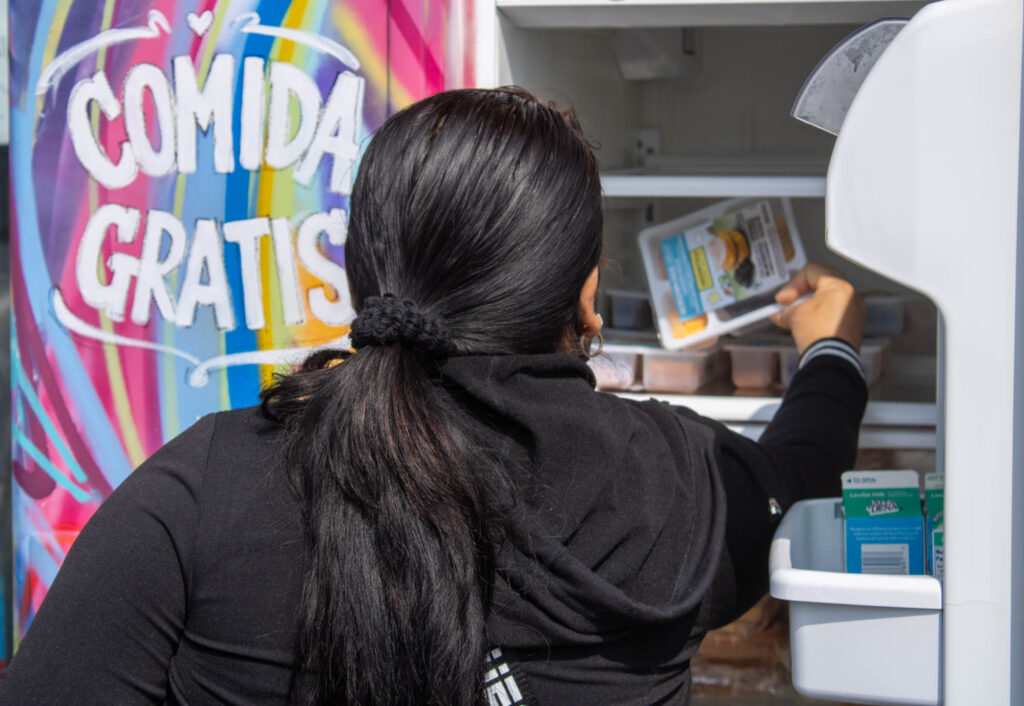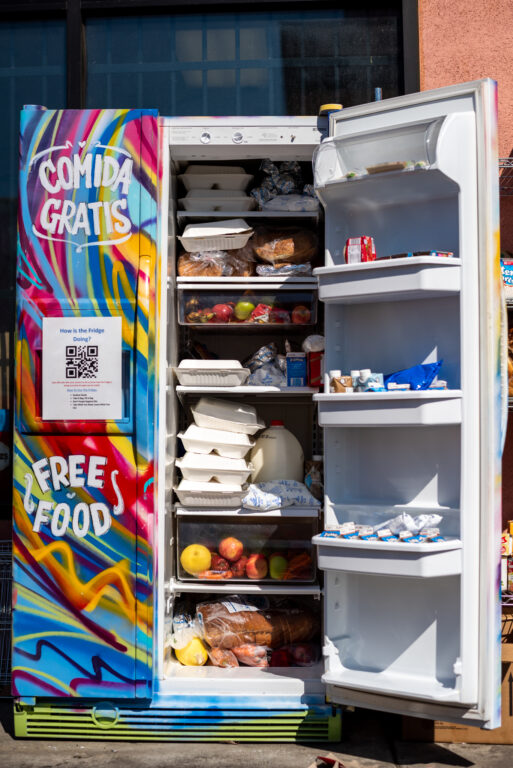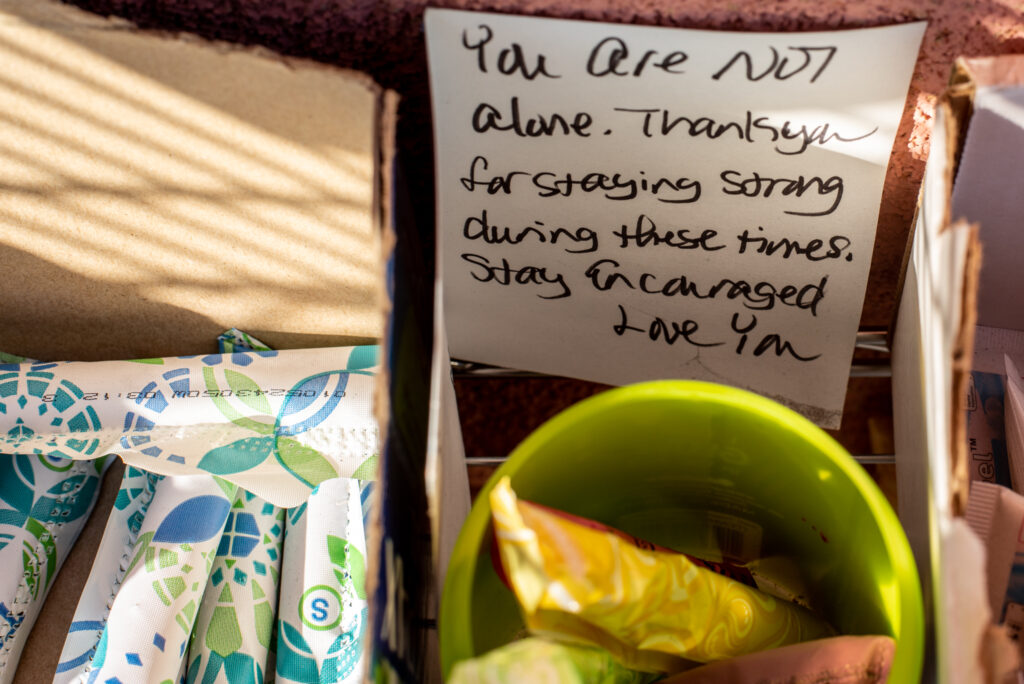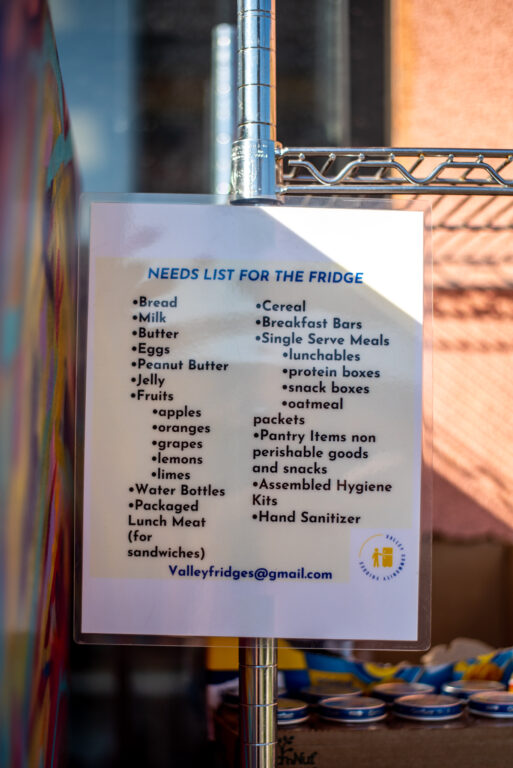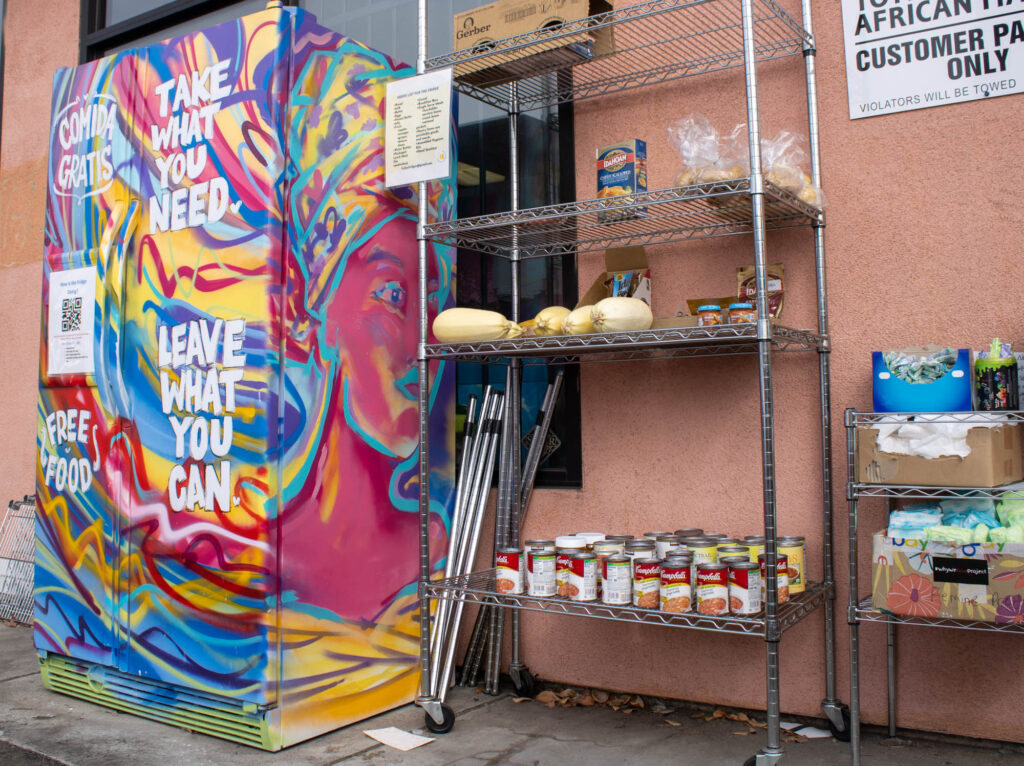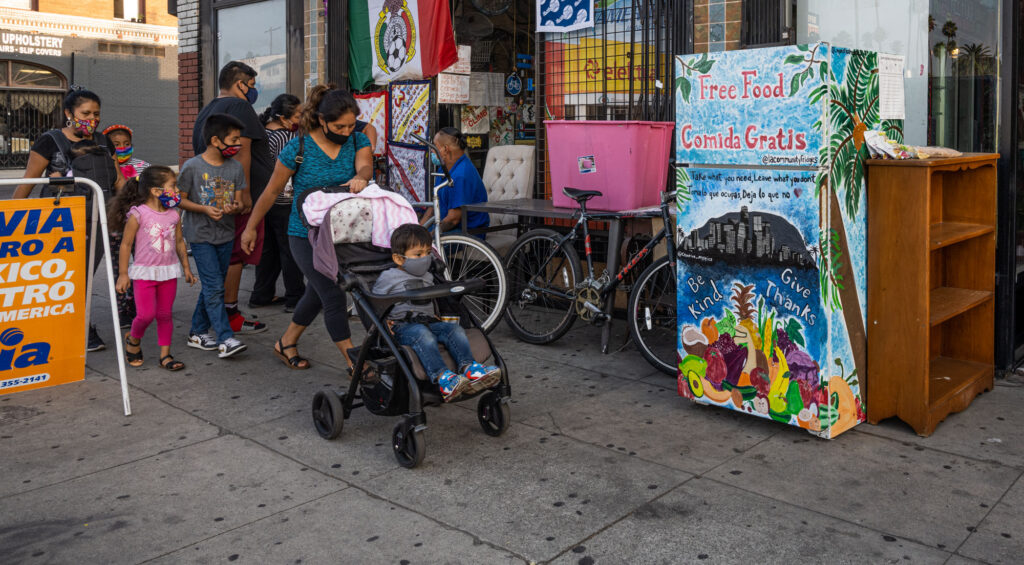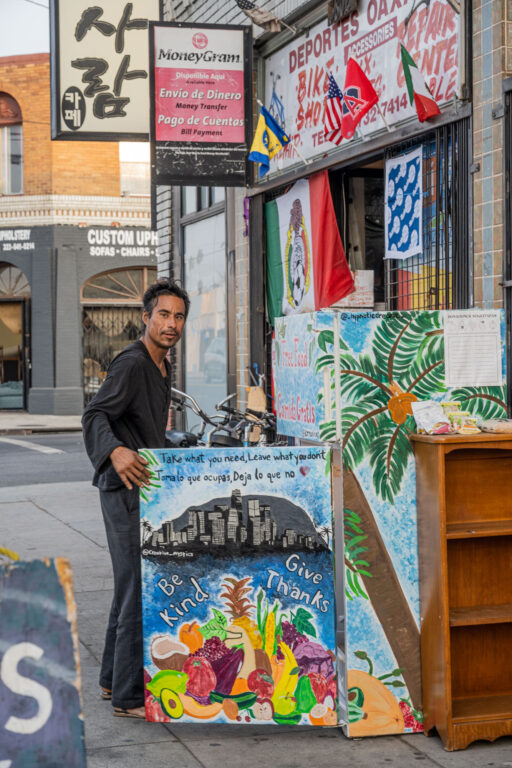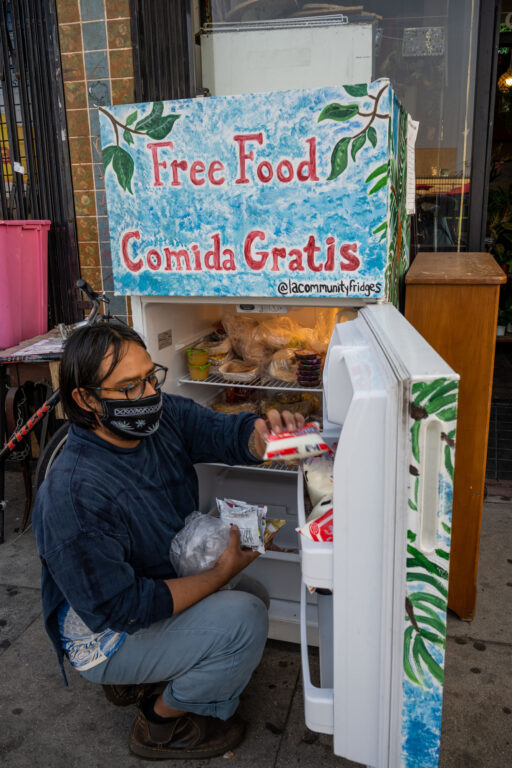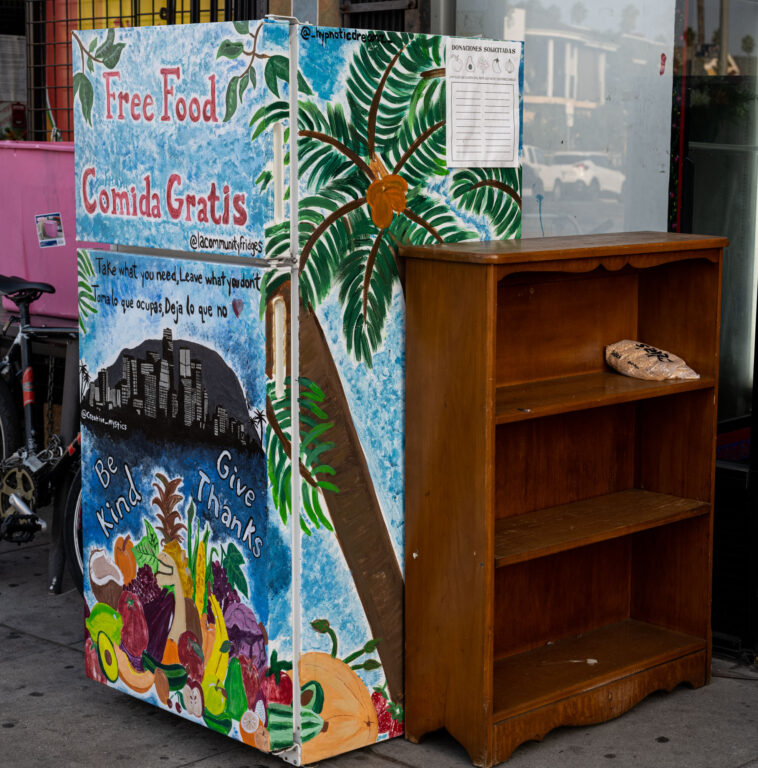After walking for miles on Sepulveda Boulevard in search of cans and plastic bottles to trade for income, Jose M. frequents a refrigerator painted in a tie-dye design and installed on a parking lot in North Hills, California.
He grabs a water bottle to hydrate from the heat, an apple for a quick snack and a premade meal to eat once he returns home.
To passersby, the fridge may look out of place since it’s surrounded by mechanic repair shops. But for Jose, who didn’t reveal his surname because he’s undocumented, and other residents in Los Angeles county it’s where he receives free food and other basic needs from the Los Angeles Community Fridges (LACF).
The LACF is a mutual aid project that stations refrigerators and pantries throughout Los Angeles county. It’s not a non-profit, rather the work of samaritans who donate goods to keep necessities in stock. This one in North Hills has a motto painted on it: Take what you need, leave what you can.
“A young lady told me, ‘You can grab whatever you’d like,’” Jose said in Spanish. “I feel less stressed that the little I make collecting cans doesn’t have to be spent on food for myself.”
The LACF began when a group of Angelenos were inspired by a phenomena spreading across New York boroughs in June: the appearance of fully stocked refrigerators offering free food on public sidewalks.
Karin Nord has volunteered at the LACF since its beginning and said in a Zoom interview that there aren’t founding members in this project. She said it was established as a community to serve people who aren’t receiving assistance during the pandemic, such as undocumented people and those without employment history.
Nord has been affected too, with her receiving a weekly unemployment check of $150–a quantity Nord said is unsurprising.
“The city is too busy doing street sweeps and taking homes away from houseless people. They’re not really focusing on providing any sort of relief which is disappointing,” Nord said. “That’s why it’s so important to have mutual aid groups like this so we can pick up the slack.”
As of yet, the LACF has established 18 refrigerators. On its website, people can search for the nearest fridge, what’s in stock and what needs stocking.
Volunteers donate food such as bread, fruit and beverages. Restaurants and other meal organizations donate prepared meals. Some fridges also have a pantry to provide canned goods and sanitary items.
There’s a process in placing these fridges. Since the LACF works as a resource for communities, they often receive Instagram DMs inquiring about beginning a fridge in certain neighborhoods. Then the LACF interviews small businesses that are local and not contributing to gentrification.
“People who we are serving may not necessarily feel comfortable going and frequenting these types of [gentrifying] businesses,” Nord said. “We want to put them where people are already going so that they can feel safe.”
In the North Hills location, Toyin’s Fashion and African Market provides electricity to power the outdoor fridge. Mildred Adebowale is the 17-year-old daughter of the store owner and said that they sponsor the fridge to assist people who are experiencing food insecurity.
“We wanted to have a dignified way to serve the homeless and we felt that with the refrigerator, anyone can come, shop and serve themselves as if they were at home,” Adebowale said.
But how does one acquire so many fridges? In the beginning, the LACF would buy them on Craigslist. Now that the project is gaining momentum, people have donated their used fridges. Nord says that at the moment she has about 10 fridges on her driveway, waiting to be placed in needed communities.
A common theme among the refrigerators is how it’s adorned with artwork. Nord said the LACF collaborates with local artists who are often people of color, women or gender non-conforming.
Yajaria Sesmas is an Angeleno who painted two fridges at the Arlington Heights location. Inside the flower and clothing shop of Yeaj Yalhalhj: Floreria Aquino, a merchandising refrigerator is decorated in Oaxacan florals.
Outside on the sidewalk, another fridge sits. It’s similar to an average fridge, except it serves as a canvas for a hand-painted blue exterior that’s aligned with palm trees, a replica of the Los Angeles skyline and an assortment of fruits.
Sesmas said in a Zoom interview that she’s happy to display her art anywhere, but she was drawn to the LACF because she also believes the government isn’t providing basic needs.
“It’s great that community members feel like, ‘You know what, let’s do it ourselves,’” Sesmas said. “If we have the resources to fend for ourselves and each other, then let’s go ahead and do that because we–unfortunately–can’t rely on these government structures.”
In the LACF mission statement, it explains that the network isn’t government-funded because the city has “shown repeatedly that they will actively work against” them.
This is in response to fridges receiving citations from public health officials, resulting in the closing of locations such as in Compton and Long Beach.
Health and Human Services Environmental Health Manager Judeth Luong from the City of Long Beach Department of Health and Human Services, said in a phone interview that the department received an anonymous complaint about the local LACF fridge and assigned an inspector to investigate it.
“We did not shut it down or ask them to discontinue it because of the complaint,” Luong said. “We asked them to discontinue using it because they had not secured a proper permit for that and because we felt that the safety of the food could be jeopardized.”
Loung said concerns about the food potentially being compromised included whether it was stored in the correct temperature, the uncertainty regarding the sources providing food and the possibility of vermin contaminating food.
To prevent further citations, Nord said the LACF is communicating with city officials.
Despite not having a permit at the moment, the Los Angeles Community Fridges continue their effort to make basic needs accessible. They’re planning on opening more locations in the San Fernando Valley and are in the early stages of designing a solar powered fridge to place in a homeless encampment.
“It’s so important that we take care of each other and that we don’t just set up the fridges and leave them there,” Nord said. “We need to continuously work on keeping them stocked, clean and dignified so that it can be a long term resource.”

